

Russia Plans To Test Nuclear Missile Bigger Than 'Satan' Russia’s Sarmat intercontinental ballistic missile is set for a drop test this year and a test launch within a year and a half of the drop test, Russian defense sources told ITAR-TASS on Thursday.
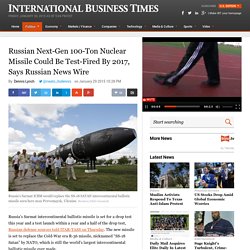
The new missile is set to replace the Cold-War era R-36 missile, nicknamed “SS-18 Satan” by NATO, which is still the world’s largest intercontinental ballistic missile ever made. Russian technicians will conduct a “drop test” at some point this year to measure the missile’s lift and proper evolution through its launch stages before they conduct a full test launch, provided the missile performs. Native Hawaiians to Federal Government: Give Us Back Our Kingdom. The federal government posed a series of questions to Native Hawaiians, with whom it's seeking to reestablish nation-to-nation status.
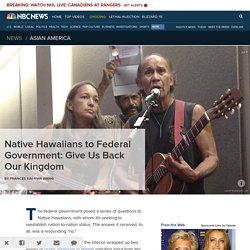
The answer it received, to all, was a resounding "no. " This week, the Department of the Interior wrapped up two weeks of public meetings in Hawaii soliciting input from the Native Hawaiian community on setting up a similar structure to the one it has with Native American tribes. Kale Gumapac was one of the 130 people who signed up to speak in Hilo on the island of Hawaii. “[On] the questions that you raised for everyone to answer. It’s a trap," said Gumapac. Frances Kai-Hwa Wang Gumapac and hundreds more showed up to testify at the fifteen public hearings held on the islands of Oahu, Lanai, Molokai, Kauai, Hawaii, and Maui. Residents delivered passionate accounts of Hawaiian history, U.S. militarism, cultural and environmental degradation, land disputes, and a steady stream of "no's" to the five questions asked by the Department of Interior. American Imperialism: Crash Course US History #28.
Cuba. Monroe Doctrine (1823) The Monroe Doctrine was articulated in President James Monroe's seventh annual message to Congress on December 2, 1823.
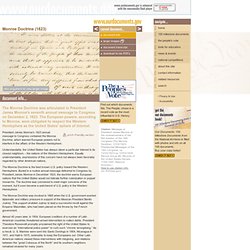
The European powers, according to Monroe, were obligated to respect the Western Hemisphere as the United States' sphere of interest. President James Monroe’s 1823 annual message to Congress contained the Monroe Doctrine, which warned European powers not to interfere in the affairs of the Western Hemisphere. Understandably, the United States has always taken a particular interest in its closest neighbors – the nations of the Western Hemisphere. Equally understandably, expressions of this concern have not always been favorably regarded by other American nations.
Theodore Roosevelt's Corollary to the Monroe Doctrine (1905) In his annual messages to Congress in 1904 and 1905, President Theodore Roosevelt expanded the Monroe Doctrine.
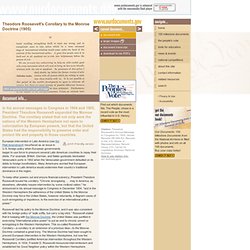
The corollary stated that not only were the nations of the Western Hemisphere not open to colonization by European powers, but that the United States had the responsibility to preserve order and protect life and property in those countries. European intervention in Latin America (see the Platt Amendment) resurfaced as an issue in U.S. foreign policy when European governments began to use force to pressure several Latin American countries to repay their debts. For example, British, German, and Italian gunboats blockaded Venezuela’s ports in 1902 when the Venezuelan government defaulted on its debts to foreign bondholders.
Pictures. Puerto Ricans favor statehood for first time. (File photo) Puerto Ricans voted in favor of statehood, marking the first time such an initiative garnered a majority.
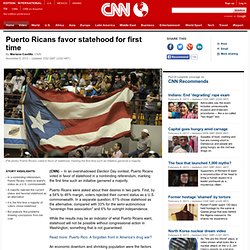
In a nonbinding referendum, Puerto Ricans voted on island's status as a U.S. commonwealthA majority rejected the current status and favored statehood as an alternativeIt is the first time a majority of voters chose statehoodBut analysts find problems drawing conclusions from the vote (CNN) -- In an overshadowed Election Day contest, Puerto Ricans voted in favor of statehood in a nonbinding referendum, marking the first time such an initiative garnered a majority. Puerto Ricans were asked about their desires in two parts. First, by a 54% to 46% margin, voters rejected their current status as a U.S. commonwealth.
In a separate question, 61% chose statehood as the alternative, compared with 33% for the semi-autonomous "sovereign free association" and 6% for outright independence. Read more: Puerto Rico: A forgotten front in America's drug war?